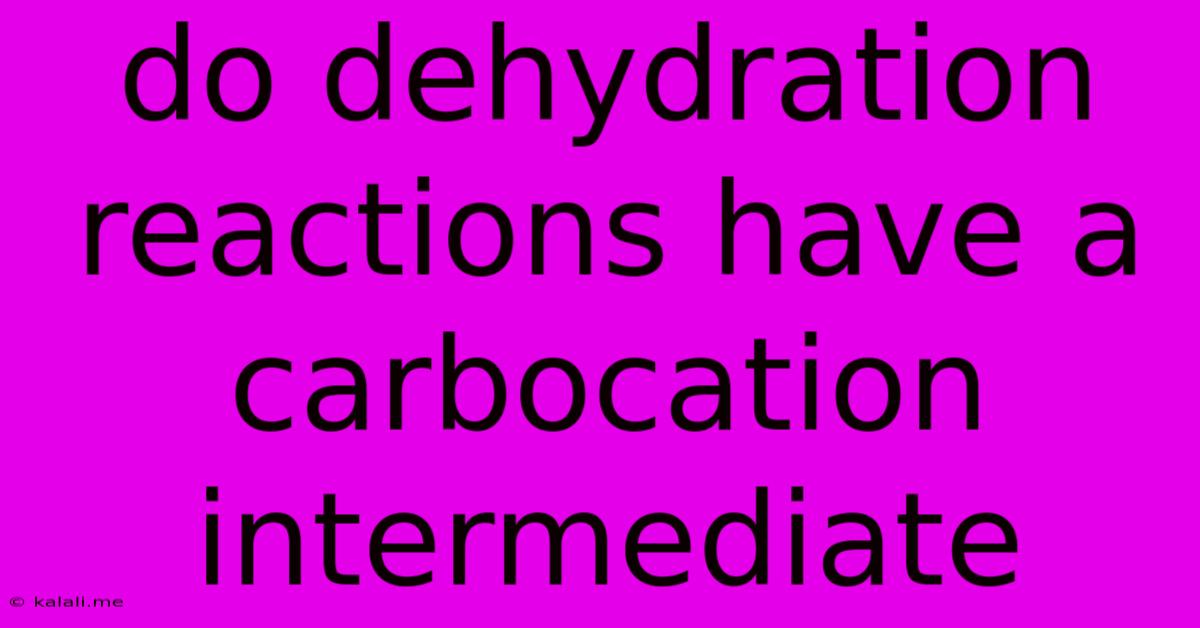Do Dehydration Reactions Have A Carbocation Intermediate
Kalali
May 29, 2025 · 3 min read

Table of Contents
Do Dehydration Reactions Have a Carbocation Intermediate?
Meta Description: Dehydration reactions, commonly used in organic chemistry, often involve the formation of a carbocation intermediate. This article delves into the mechanism, exceptions, and factors influencing carbocation stability in dehydration reactions.
Dehydration reactions, a fundamental process in organic chemistry, involve the removal of a water molecule from a substrate, typically an alcohol. This seemingly simple reaction often proceeds through a mechanism involving a crucial intermediate: the carbocation. However, the presence of this carbocation isn't always guaranteed, and the specifics depend on several factors.
The Typical Mechanism Involving a Carbocation
The most common dehydration reaction mechanism for alcohols involves a three-step process:
-
Protonation: The hydroxyl group (-OH) of the alcohol is protonated by a strong acid, such as sulfuric acid (H₂SO₄) or phosphoric acid (H₃PO₄). This converts the poor leaving group (-OH) into a better leaving group, water (H₂O).
-
Carbocation Formation: The protonated alcohol loses a water molecule, resulting in the formation of a carbocation. This is a high-energy, unstable intermediate, meaning its formation is the rate-determining step. The stability of this carbocation significantly influences the reaction rate and the outcome of the reaction. Tertiary carbocations are the most stable, followed by secondary, and then primary carbocations. Methyl carbocations are the least stable.
-
Deprotonation: A base (often the conjugate base of the acid used in the first step) abstracts a proton from a carbon adjacent to the carbocation, forming a double bond (alkene) and neutralizing the charge. This step is generally fast.
Factors Affecting Carbocation Formation and Stability
Several factors influence whether a dehydration reaction proceeds through a carbocation intermediate and its stability:
-
The structure of the alcohol: Tertiary alcohols readily undergo dehydration via a carbocation intermediate because the resulting tertiary carbocation is relatively stable. Primary alcohols, however, are less prone to this mechanism due to the instability of the primary carbocation. They may follow alternative pathways.
-
Reaction conditions: The strength and concentration of the acid catalyst, as well as the reaction temperature, all impact the rate of carbocation formation and its subsequent reactions. Higher temperatures generally favor the formation of the more substituted (and therefore more stable) alkene product, following Zaitsev's rule.
-
Rearrangements: Sometimes, a less stable carbocation can rearrange to form a more stable carbocation through hydride or alkyl shifts. This rearrangement can lead to unexpected products.
Exceptions and Alternative Mechanisms
While the carbocation mechanism is prevalent, it's not universal for all dehydration reactions. For instance:
-
Primary alcohols: As mentioned, primary alcohols may not readily form stable carbocations. They may proceed through an E2 elimination mechanism, which is a concerted reaction (no carbocation intermediate is formed).
-
Specific reaction conditions: Under certain conditions, such as using a very strong base, an E2 mechanism might be favored even for secondary or tertiary alcohols.
Conclusion
In summary, while many dehydration reactions of alcohols proceed through a carbocation intermediate, this isn't always the case. The structure of the alcohol, reaction conditions, and the possibility of rearrangements all play crucial roles in determining the mechanism and the final products. Understanding carbocation stability and alternative reaction pathways is essential for predicting the outcome of dehydration reactions. Further exploration into specific examples and detailed reaction mechanisms will enhance your comprehension of this important organic chemistry concept.
Latest Posts
Latest Posts
-
Can Iphone Download Texts That Were Unsent
May 31, 2025
-
Wiring A Ceiling Fan To Two Switches
May 31, 2025
-
How Long Is Lasagna Good For
May 31, 2025
-
How To Indent A Line In Latex
May 31, 2025
-
Hoe Long Does Sickened Last 2e
May 31, 2025
Related Post
Thank you for visiting our website which covers about Do Dehydration Reactions Have A Carbocation Intermediate . We hope the information provided has been useful to you. Feel free to contact us if you have any questions or need further assistance. See you next time and don't miss to bookmark.